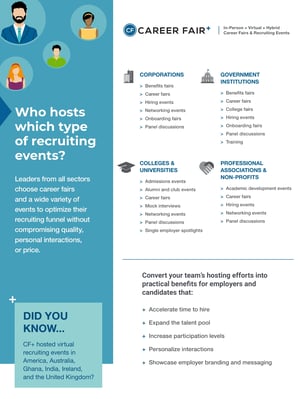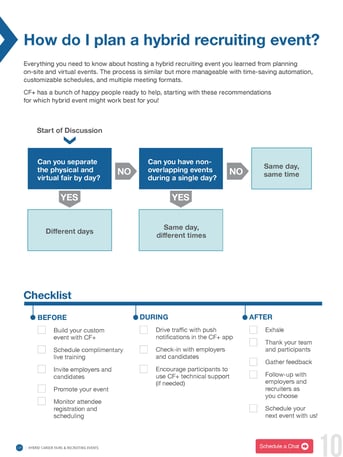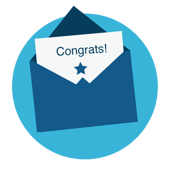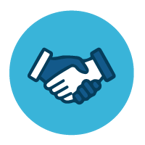
.png?width=129&name=slidedeck-(1).png)
Four former college and university recruiters launched Career Fair Plus (CF+) in 2012 to enhance employer and job seeker interactions during in-person recruiting events with proprietary technology. Since then, millions of applicants have connected with tens of thousands of employers during dozens of different types of recruiting programs.
We’re pursuing the same mission today: help event organizers improve outcomes for their job seekers by applying employer and candidate feedback to continually innovate our recruiting platform.
Depending on when you started your job search, in-person or hybrid recruiting might be a new experience. Or, you're returning to the workforce after years away and navigating virtual conversations with potential employers for the first time. Read through these five sections for insights to boost your confidence and enhance engagements.

Aside from the obvious differences of meeting face-to-face, online, or both, your preparations might vary with each format. Of course, you need an updated resume for any job search, but you'll likely need nicely printed copies for in-person or hybrid recruiting events.
Additionally, unlike virtual events, talking with recruiters at on-site programs usually means waiting in long lines. Unfortunately, you might not even connect, depending on when you join the line.
Pro Tip: if your event host is using CF+ software with Meetings and Resume Drop, you can pre-schedule 1:1 time with recruiters and connect before, during, and after the event!
Virtual recruiting events avoid this problem by offering chats, group information sessions, or 1:1 meetings. They also provide the opportunity to literally dress "up." Plenty of candidates look professional from the waist up with their lucky sweatpants or torn blue jeans, offering some calming vibes off-camera.
Finally, hybrid events, as you can guess, blend on-site with virtual programming although specific structures vary. CF+ customers have three hybrid options:
Along with the different engagement format, your job search might take you to career fairs, hiring events, and other types of recruiting programs.

For example, career fairs allow job seekers to talk with employers, learn about future opportunities, and attend webinars or seminars related to different career paths. Employers host or participate in hiring fairs to extend job offers during or, very soon after the event.
And because not all job seekers are college students, there are various programs connecting them to potential employers, too.
View CF+ Hybrid Recruiting eGuide Page 10
 What are the benefits of attending recruiting programs?
What are the benefits of attending recruiting programs?There are multiple advantages of participating in recruiting events, some you’ll notice immediately, and others you’ll realize over time:
Also helpful:
5 Things to Know Before You Attend a Job Fair
The Most Important Thing You Can Do To Prepare For a Career Fair
 How do I get the most from a recruiting event?
How do I get the most from a recruiting event?Excellent question; we're glad you asked! OK, we asked it, but you were probably wondering. Some of these suggestions come together quickly, while others take a little extra thought and energy:
Also helpful:
All your hard work and practice answering questions paid off. Way to go! Time to shift mental gears from maximizing recruiting events to rocking the interview. But, good news! It's a faster, easier shift than you might think.
Not surprisingly, interviewing best practices are similar to how you get the most from career fairs or recruiting events: prepare, practice, present, and follow through.
Review and refresh your resume again, especially if you can add new experiences since the recruiting event where you met company representatives. Similarly, take another look at your elevator pitch and personal story. Do you want, or need, to change anything? Now's the perfect time to revise.
Call a friend or clean off a mirror but get ready to share your career highlights and elevator pitch again. If someone’s helping you rehearse, ask them about your eye contact, facial expressions, and overall body language. Do you appear welcoming and confident, or are you looking around the room while you talk?
It's interview time! Trust your knowledge, passion for the work, and all that practice to share why you're their best choice. Answer questions confidently and directly, then ask two or three of your own. Be polite. Sure, that seems obvious, but it's easy to forget "please" and "thank you" in new situations. Be honest, and remember the correct spelling and job title of your interviewer(s) for the next step.
Send a handwritten thank you note to each interviewer and, if possible, the HR person who organized the day. Compose the note yourself or personalize a sample you find online. Because many people decide this step is old-fashioned, the candidates who make an effort often stand out.
Interviewing is stressful, but preparation and the right support can decrease anxiety and increase your chances of success. Check out the CF+ article, Be Prepared: Behavioral Questions, for more tips and encouragement!